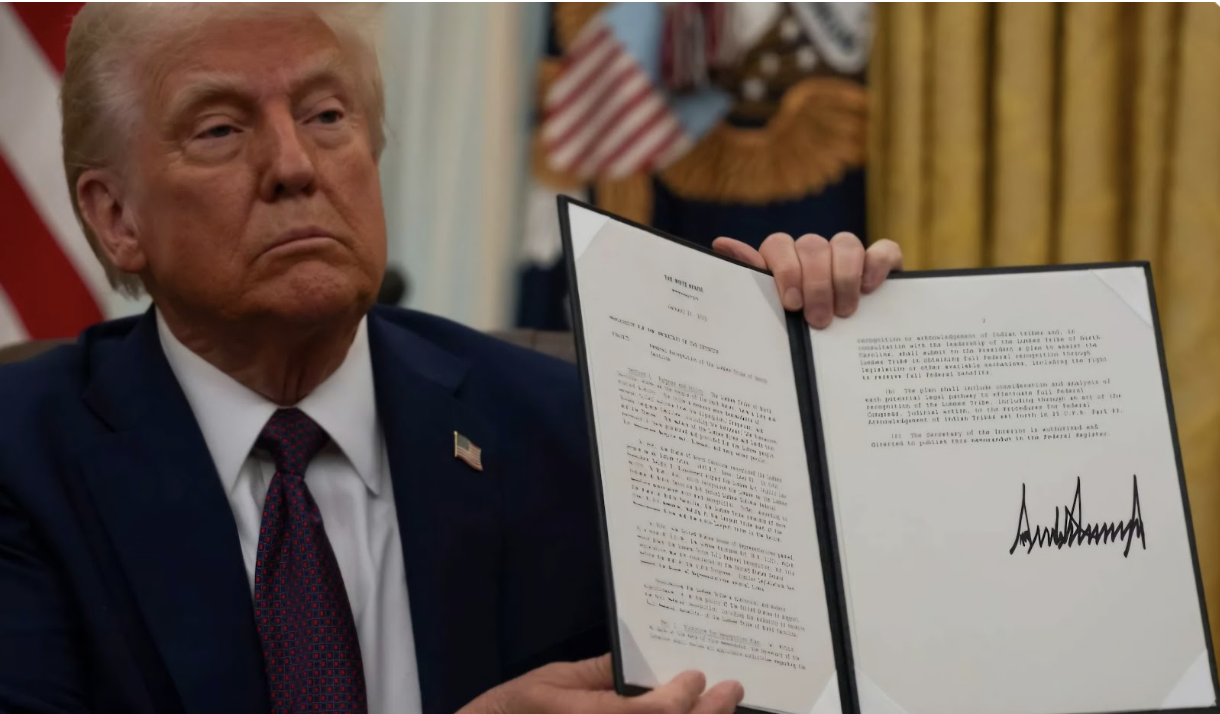President Donald J. Trump signs an Executive Order to redefine birthright citizenship on January 20, 2025. Photo via CIAR California
***
In one of his first acts after he returned to the White House, President Donald Trump issued and signed an executive order to redefine birthright citizenship. This marks one of many controversial decisions that the President has made throughout the first weeks of his second term, one that has rallied seven immigrant rights organizations to lead the fight against the federal government’s decision in a highly anticipated legal battle.
In addition to this, two U.S. federal judges, Deborah Boardman, U.S. District Judge for Maryland, and John C. Coughenour, U.S. District Judge for Western Washington, have now blocked the President’s executive order with both judges citing concerns over its violation of the 14th Amendment, enshrined in the United States Constitution. According to a recent poll, 59% of Americans disapprove of President Trump’s decision to end birthright citizenship, signifying concerns for the Republican Party’s national agenda on immigration.
The concept of birthright citizenship has been redefined throughout the United States’ centuries-long history. For instance, the decision made by the United States Supreme Court in Dred Scott v. Sandford (1857) denied citizenship to escaped African slaves who were born in the country. When the Civil War concluded, the United States Congress passed the Civil Rights Act of 1866, the first piece of legislation that provided the citizenship clause within the 14th Amendment of the U.S. Constitution. It allows all people born in the United States (with the exception of Native Americans) to have citizenship.
However, the Supreme Court’s landmark decision in United States v. Wong Kim Ark (1898) was the most consequential moment that defined birthright citizenship. The Supreme Court ruled that Wong Kim Ark, a Chinese man born in the United States to parents classified as legal permanent residents, was a U.S. citizen by law under the Citizenship Clause of the 14th Amendment. Despite being legally born in the United States, Wong Kim Ark traveled from China and was denied entry into the country under the basis of the Chinese Exclusion Act passed in 1882, which imposed limits on Chinese immigration. The decision made by the Supreme Court effectively ruled that a child born in the United States whose parents are non-citizens could gain citizenship and have the same rights as any other citizen.
This executive order is just one of many instances where President Trump has shown no concern for the legal process. Legal scholars, such as Gerald L. Neuman, a J. Sinclair Armstrong Professor of International, Foreign, and Comparative Law at Harvard Law School, have emphasized that the President does not have unilateral authority to amend the 14th Amendment’s Citizenship Clause in the Constitution. Nevertheless, the President’s authoritarian governing style marks a sharp departure from the approaches taken by his predecessors to achieve his and the Republican Party’s agenda on curbing immigration levels in the country.
But the biggest consequence of President Trump’s executive order will fall on immigrant families. Many immigrants in high-skilled labor on the H1B visa and the F1 student visa face the risk of being denied U.S. citizenship if one of their parents was a non-US citizen at the time of his or her birth. Those with tourist visas are also not safe from the Trump administration’s crusade against immigration, with many legal scholars calling into question how the executive order will now broaden what defines U.S. citizenship thanks to the President’s goal of redefining what a U.S. citizen is.
So, are there any upsides to this? So far, President Trump faces a total of six lawsuits backed by over 22 states. Two judges have now blocked the President’s executive order, disapproving the President’s action on redefining birthright citizenship. With that in mind, it’s safe to say that these roadblocks are a sign that the President is once again learning the hard way about the rule of law. Only time will tell how successful the Trump administration will be in playing this legal game of musical chairs.
***
This article was edited by Brianna Budhram and Michael Adcock.
